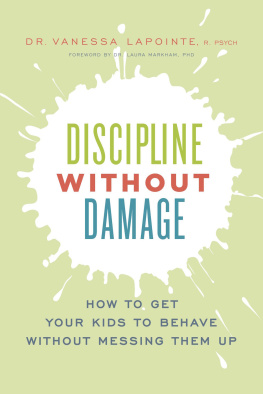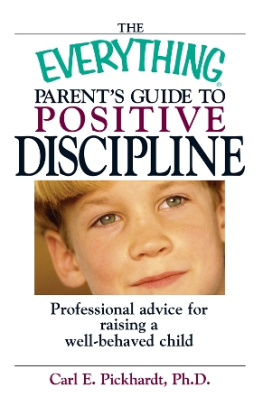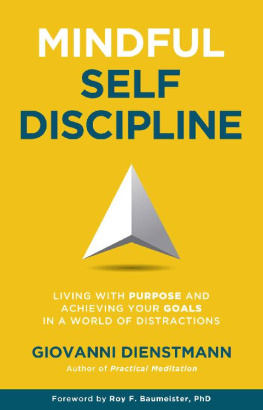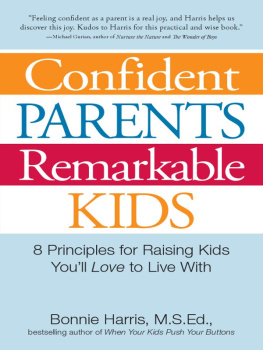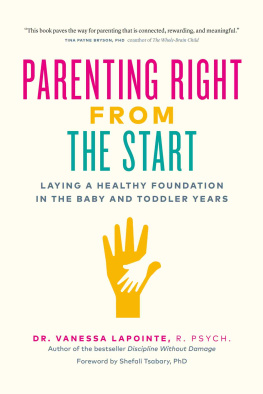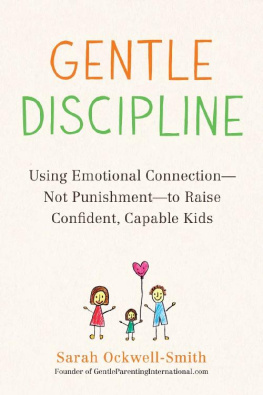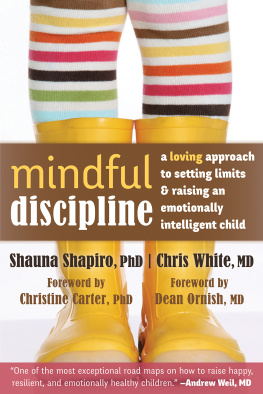For my boysbig and small
I
CONNECTION MAKES
THE WORLD GO ROUND
& GROWS BRAINS
WHAT DISCIPLINE IS & IS NOT
Everyone has an opinion about discipline. Experts weigh in on the subject from every angle, and parents often say they feel totally lost in knowing what works and what doesnt, what they are supposed to be doing and not doing. Typically by the time their children reach their second birthday, parents are consumed by the subject of discipline. They wonder, am I going to mess my child up for life? Is everyone around me going to judge my parenting? Is my child going to be able to survive in a kindergarten classroom? Am I being too tough? Am I being too soft? Does she know I love her? Will he still love me? Is this going to work? Am I slowly wrecking her? If it doesnt feel right, should I still do it? These kinds of questions are very natural for caring big people to have. To give you answers to some of these questions and put you at ease with others of them, I will walk you through the basic science of child development and how you can translate this knowledge into action for your child.
WHAT IS DISCIPLINE?
When we feel overwhelmed by not really knowing how to approach discipline, big people often turn to the Internet and books to try to figure it out. The trouble is that rather than answering questions, the information overload from all of these many sources often creates even more questions. And most of these sources offer a version of how to discipline, with very little discussion about why. My belief is that there is no getting to the how if we have not first figured out why. And to figure out why, we really need to ask a simple question: what is discipline?
Many times when I ask this question at workshops, in support sessions, or onsite at community daycares, schools, and other places, the answers I get have something to do with preparing children for the realities of the world. A lot of us believe that our children are going to have to conform to the standards, regulations, expectations, and rules of the world around them sooner or later, so we might as well pave the way by firmly applying said standards, regulations, expectations, and rules right away. If we dont, we reason, how will they ever keep friends? How will they ever succeed at school? How will they ever hold down a job? The thinking behind such a response is that children need to learn to walk within the lines and do things as the world expects.
While I dont disagree that things may become quite challenging for a child who cannot keep her unkind thoughts to herself, who cannot get moving on a task or chore that has to be completed, or who cannot be relatively pleasant to the people around her, I have some trouble with the logic that extending adult realities to a childs world is actually going to create the desired outcomes. That is, many big people assume that because their children will have to take it on the chin, suck it up, and carry on when they become adults, subjecting children to those harsh realities in childhood will give them lots of time to prepare for adulthood. Unfortunately, developmental science does not support this theory. Instead, as the term developmental alludes to, growing up involves a progression through many different levels of capacity and maturity. Children are not just smaller versions of adults.
Developmentally, children are very different from big people. The frontal and prefrontal cortex in their brains are comparatively immature, and as a result, children have a lesser capacity for self-control. Put another way, children are naturally impulsive until their brains develop enough to allow them to exercise self-control. In studies conducted in the 1960s and 70s, the famous Stanford marshmallow experiment showed this correlation between self-control and age. Young children were seated in an empty room at a table that had a marshmallow on it. They were told they could eat that marshmallow if they wanted, but if they waited fifteen minutes, they would be allowed to eat 2 marshmallows. The results showed that the older the child, the more likely it was that she would wait and reap the rewards of the second marshmallow. Or in other words, self-control comes with development and is strengthened over time and with experience. That is, adults are always going to be better at self-control than children because they are older.
If the frontal and prefrontal cortex are the areas of the brain most strongly implicated in the ability to maintain self-control, and these areas of the brain are the last to mature for the growing child, then it makes sense that children are naturally not going to have a lot of self-control. So until nature has actually grown for them the neural infrastructure needed to support self-control, it really does not make sense that we ask children to conform to the standards, regulations, expectations, and rules of the world. They simply cannotas opposed to will notfollow through on much of what big people might demand from them in terms of self-control.
And yet, if we relentlessly focus on preparing children for the realities of the adult world by insisting they exert self-control in a variety of situations at very young ages, we are driven to impose sanctions like consequences and time-outs, and almost desperately concoct strategies like reward charts so that our children behave appropriately. In essence, we are using these sanctions and concoctions as disciplinary measures to have children mimic self-control. The unfortunate reality is that a childs brain can be tricked into conformitybut not into self-control. It is possible to create a behavioral faade of self-control by playing upon the social-emotional needs of the child. Children need an emotional connection with their special big people, and by tying this social-emotional need to discipline, as a reward or punishment for behavior that mimics self-control, we can trick a childs brain and manipulate the resulting behavior. It is exactly at this juncture that we sacrifice the needs of our child in the name of good behavior, and it is exactly here that discipline becomes damaging.
Discipline is not self-control
As a social species, children are born into this world looking for us. In the words of Dr. Jeree Pawl, a child development specialist, Everything that we know about [children] leads to the conclusion that they seek human connection, not only to survive but for its own sake. They are born looking for us. Given a choice of what to look at in their first hours, it is always the human face they choose. Children have an intuitive sense of their need for us that is evident to any observer from the very first moments of life.
Indeed, contemporary research in the field of child development has consistently gifted us the understanding that a childs emotional and physical connection to her special big people is absolutely essential to survival and development. While this approach to discipline may appear to yield the desired behavior, it does so in the most damaging of ways.
If a child holds as his most essential need connectedness in physical and emotional ways to his special big person, then this childs brain will put everything on hold until that connection is realized. Consider the situation where a 4-year-old is playing with another child and having difficulty sharing a toy. To prevent him from stealing the coveted toy away from the other child, the adults around this child might say, We must share with our friend, and then put a limit on each childs time playing with the toy. However, these attempts at structuring self-control are inevitably going to fail. The child waiting for his turn will not be able to resist diving in for a grab, push, and dash with the toy. After all, this childs brain may not yet be mature enough to allow self-control in this situation.
Next page
